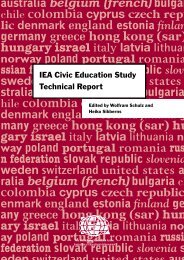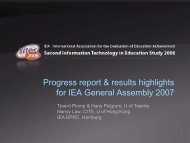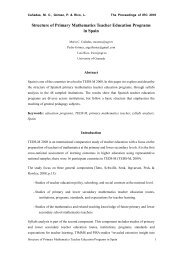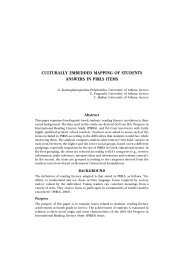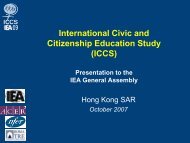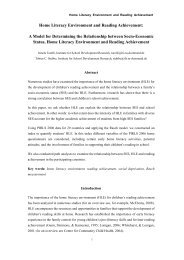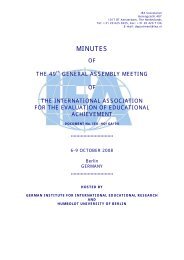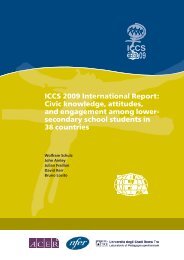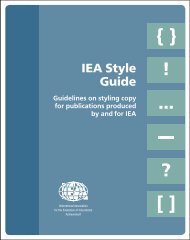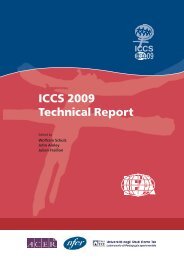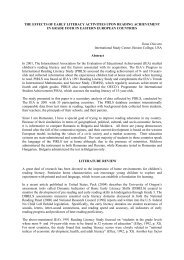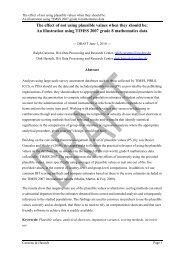International civic and citizenship education study - iccs - IEA
International civic and citizenship education study - iccs - IEA
International civic and citizenship education study - iccs - IEA
- TAGS
- civic
- citizenship
- iccs
- www.iea.nl
You also want an ePaper? Increase the reach of your titles
YUMPU automatically turns print PDFs into web optimized ePapers that Google loves.
Attitudes toward one’s nation: This construct reflects students’ attitudes toward abstract concepts<br />
of nation. One can distinguish different forms of national attachment (symbolic, constructive,<br />
uncritical patriotism, nationalism). These are different from feelings of national identity (Huddy<br />
& Khatib, 2007).<br />
The CIVED survey included 12 items reflecting students’ attitudes toward their respective<br />
countries. Four of these items were used to measure “positive attitudes toward one’s nation”<br />
(Torney-Purta et al., 2001). ICCS uses a set of eight items (four of them from CIVED) to<br />
measure students’ attitudes toward the country they live in <strong>and</strong> to cover students’ symbolic<br />
patriotism <strong>and</strong> uncritical patriotism. Two of these items relate to the concept of national<br />
pride (Huddy & Khatib, 2007) but avoid the use of the term “pride” <strong>and</strong> focus instead on<br />
students’ perceptions of satisfaction with different aspects (political system <strong>and</strong> respect for the<br />
environment) of their respective countries. The construct relates mainly to Content Domain 4<br />
(<strong>civic</strong> identities).<br />
Attitudes toward religion: Religion is sometimes viewed as an important catalyst of <strong>civic</strong><br />
participation (see Verba, Schlozman, & Brady, 1995). ICCS uses a set of six items to assess<br />
students’ attitudes toward religion. This construct relates mainly to Content Domain 4 (<strong>civic</strong><br />
identities). The set of items forms part of an international option on religious denomination,<br />
practices, <strong>and</strong> attitudes toward religion.<br />
Affective-behavioral Domain 3: Behavioral intentions<br />
Behavioral intentions refers to student expectations of future <strong>civic</strong> action. This affective-behavioral<br />
domain, assessed in the student perceptions questionnaire, contains items that ask students<br />
about their intentions toward <strong>civic</strong> action in the near future or when they are adults. Given the<br />
age group surveyed in ICCS <strong>and</strong> the limitations for 14-year-olds to participate as active citizens,<br />
behavioral intentions are of particular importance when collecting data about active <strong>citizenship</strong>.<br />
One important aspect of measuring behavioral intentions in the area of <strong>civic</strong>s <strong>and</strong> <strong>citizenship</strong><br />
is political participation. This aspect can be defined as “activity that has the intent or effect<br />
of influencing government action—either directly by affecting the making or implementation<br />
of public policy or indirectly by influencing the selection of people who make those policies”<br />
(Verba et al., 1995, p. 38).<br />
During the 1970s <strong>and</strong> 1980s, protest behavior as a form of participation became more<br />
prominent in Western democracies (Barnes et al., 1997). Scholars have distinguished<br />
“conventional” (voting, running for office) from “unconventional” (social movement) activities<br />
(grassroots campaigns, protest activities). They have also distinguished, among the latter, legal<br />
from illegal forms of behavior (Kaase, 1990).<br />
Verba et al. (1995) identify the following three factors as predictors of political participation:<br />
(a) resources that enable individuals to participate (time, knowledge); (b) psychological<br />
engagement (interest, efficacy); <strong>and</strong> (c) “recruitment networks,” which help to bring individuals<br />
into politics (these networks include social movements, church groups, <strong>and</strong> political parties).<br />
The CIVED survey included 12 items measuring expected participation (voting, active,<br />
conventional, unconventional, protest). ICCS has developed a broader set of items that cover a<br />
wider range of behavioral intentions related to the following constructs or sets of constructs:<br />
• Preparedness to participate in forms of <strong>civic</strong> protest<br />
• Behavioral intentions regarding future political participation as adults<br />
• Behavioral intentions regarding future participation in <strong>citizenship</strong> activities.<br />
ICCS ASSeSSment FrAmework<br />
25



